Unit 7 International Charities Grammar课件(共35张PPT无素材)
文档属性
| 名称 | Unit 7 International Charities Grammar课件(共35张PPT无素材) |

|
|
| 格式 | ppt | ||
| 文件大小 | 2.6MB | ||
| 资源类型 | 教案 | ||
| 版本资源 | 牛津译林版 | ||
| 科目 | 英语 | ||
| 更新时间 | 2019-06-20 00:00:00 | ||
图片预览

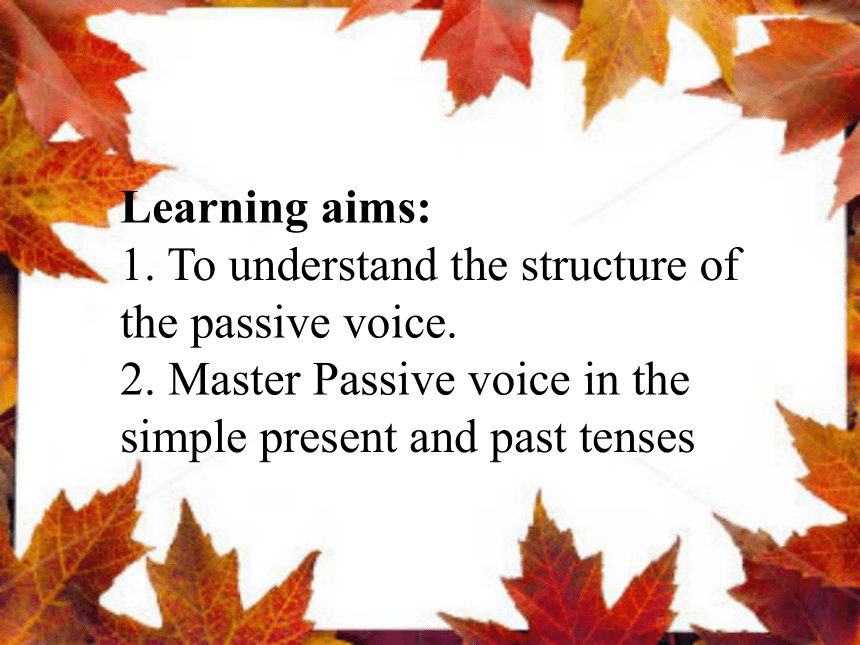
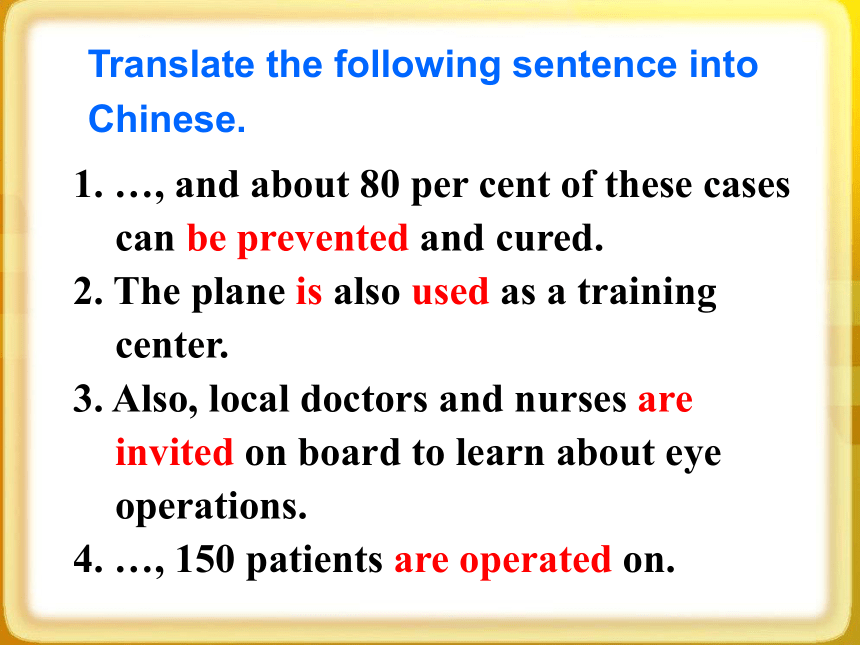
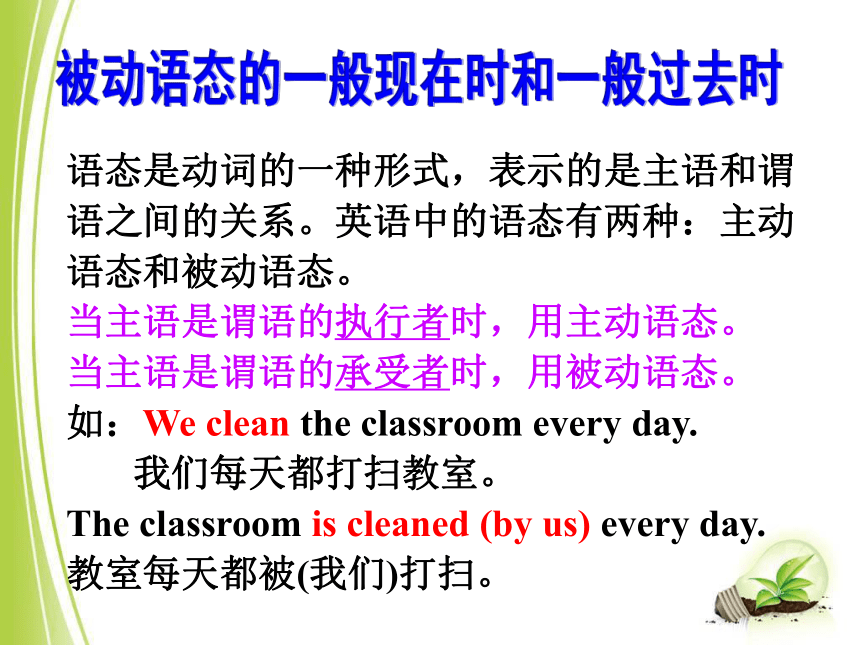
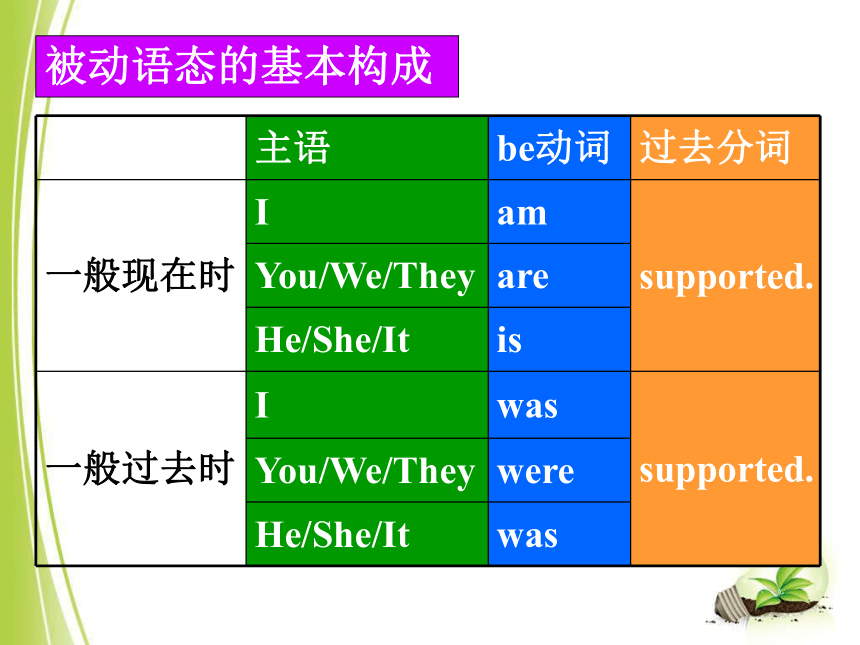
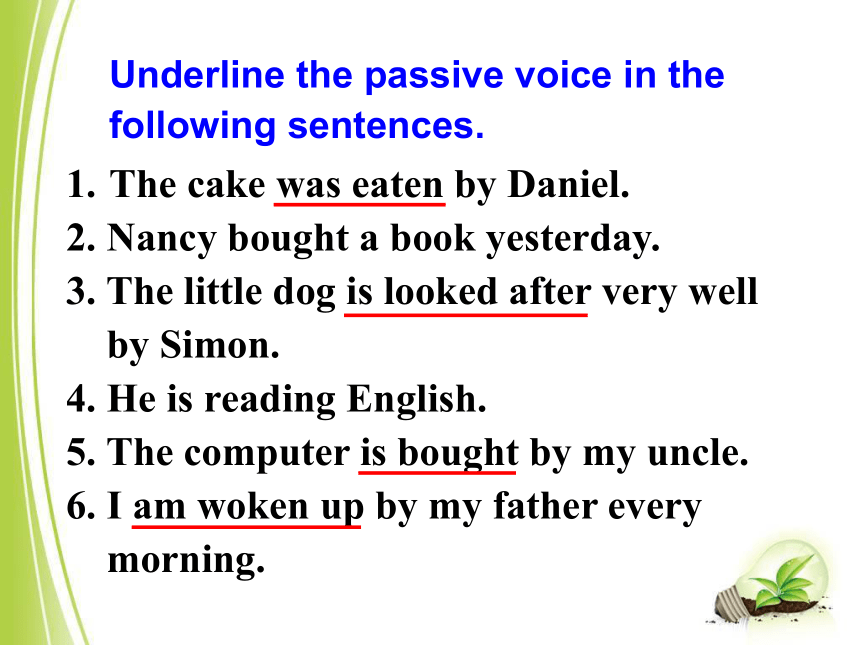
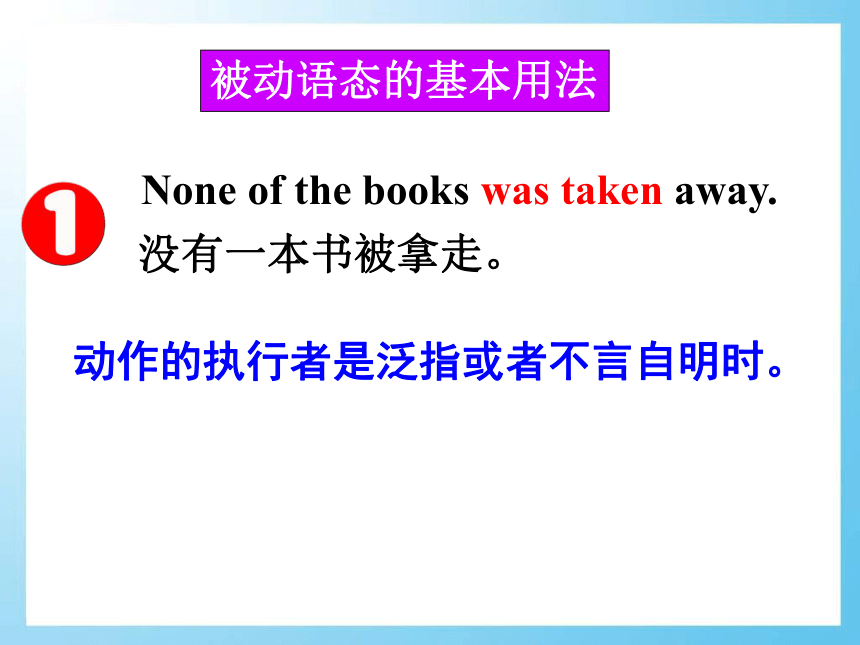
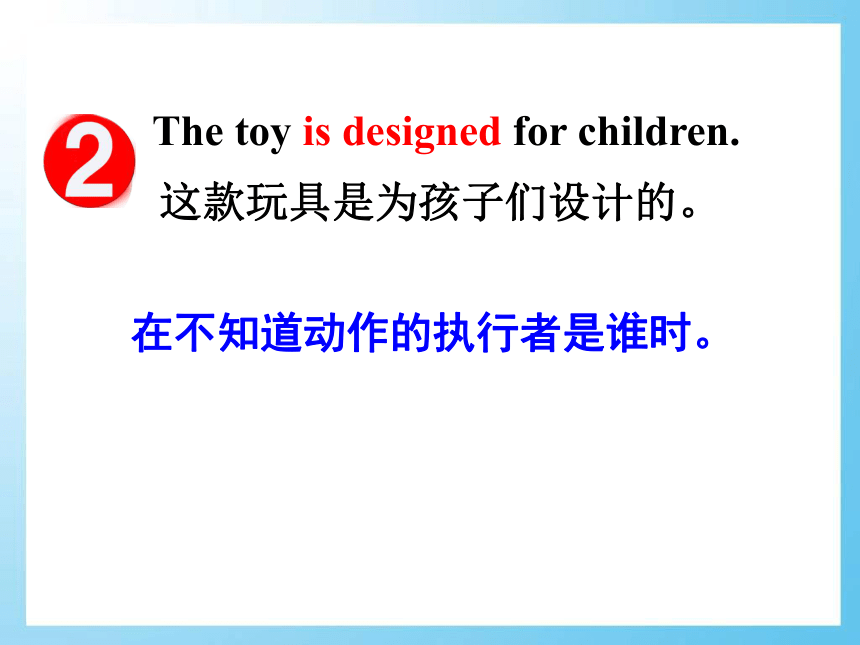
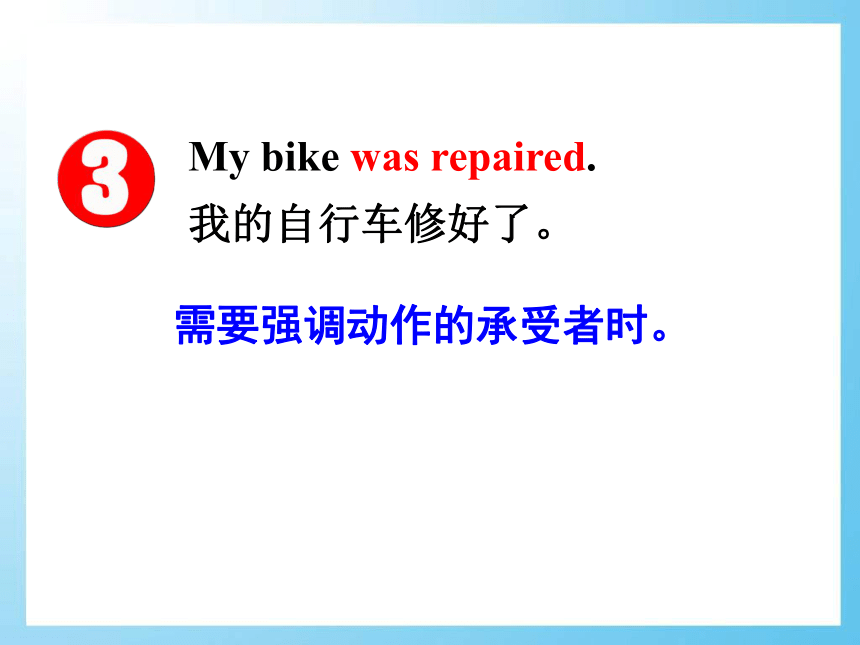

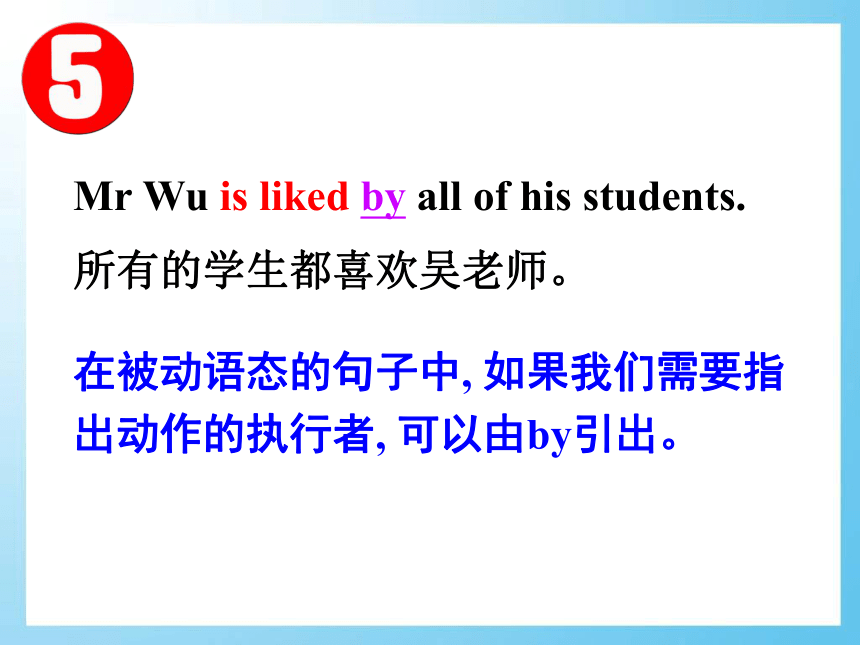
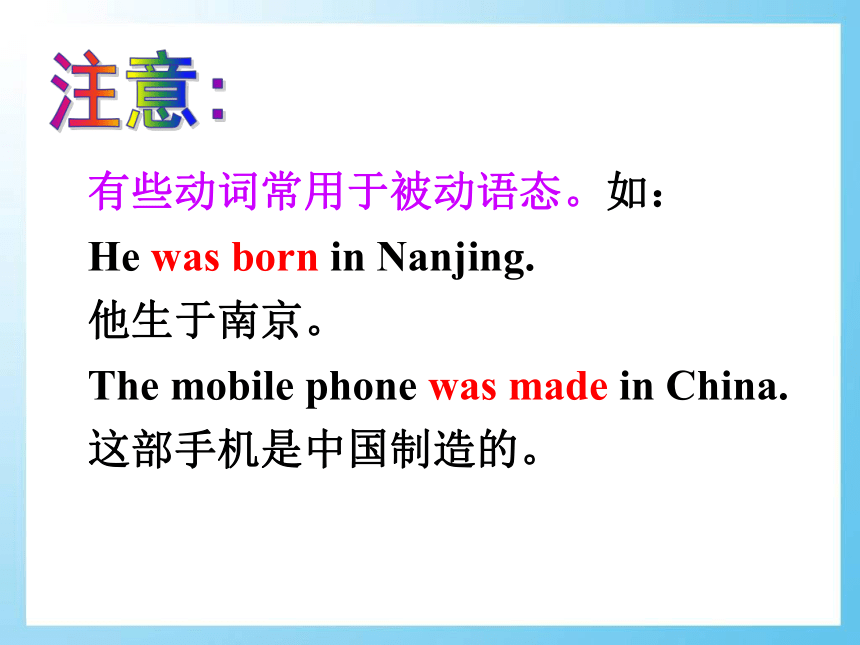
文档简介
(共35张PPT)
Learning aims:
1. To understand the structure of the passive voice.
2. Master Passive voice in the simple present and past tenses
1. …, and about 80 per cent of these cases can be prevented and cured.
2. The plane is also used as a training center.
3. Also, local doctors and nurses are invited on board to learn about eye operations.
4. …, 150 patients are operated on.
Translate the following sentence into Chinese.
语态是动词的一种形式,表示的是主语和谓语之间的关系。英语中的语态有两种:主动语态和被动语态。
当主语是谓语的执行者时,用主动语态。
当主语是谓语的承受者时,用被动语态。
如:We clean the classroom every day.
我们每天都打扫教室。
The classroom is cleaned (by us) every day.
教室每天都被(我们)打扫。
被动语态的基本构成
主语 be动词 过去分词
一般现在时 I am supported.
You/We/They are
He/She/It is
一般过去时 I was supported.
You/We/They were
He/She/It was
The cake was eaten by Daniel.
2. Nancy bought a book yesterday.
3. The little dog is looked after very well
by Simon.
4. He is reading English.
5. The computer is bought by my uncle.
6. I am woken up by my father every
morning.
Underline the passive voice in the following sentences.
None of the books was taken away.
没有一本书被拿走。
动作的执行者是泛指或者不言自明时。
被动语态的基本用法
The toy is designed for children.
在不知道动作的执行者是谁时。
这款玩具是为孩子们设计的。
需要强调动作的承受者时。
My bike was repaired.
我的自行车修好了。
The problem was talked about just now.
出于委婉或礼貌而避谈动作的执行者时。
这个问题刚才被讨论过。
Mr Wu is liked by all of his students.
所有的学生都喜欢吴老师。
在被动语态的句子中, 如果我们需要指出动作的执行者, 可以由by引出。
有些动词常用于被动语态。如:
He was born in Nanjing.
他生于南京。
The mobile phone was made in China.
这部手机是中国制造的。
1. Today English _______ all over China.
A. teach B. teaches
C. is taught D. are taught
2. The meeting _______ two weeks ago.
A. hold B. was held
C. were held D. is held
3. The thief ________ by the police last night.
A. caught B. is caught
C. was caught D. were caught
4. The photos _______ when I was young.
A. were taken B. was taken
C. are taken D. is taken
5. Millie is my best friend. I ___ often ____ to her party.
A. is invited B. am invited
C. are invited D. was invited
6. Last year Beijing ____ by a big sandstorm.
A. is hit B. were hit
C. will be hit D. was hit
主动语态和被动语态的句式转换
主动语态 主语
She 谓语(主动式)
hurt 宾语
me.
被动语态 原宾语(改为主格)
I 谓语(被动式)
was hurt by 原主语(改为宾格)
her.
主动+谓语+双宾语的句式转换
主动语态 主语
He 谓语(主动式)
passed 间宾
me 直宾
a book.
被动语态 原直宾
A book 谓语(被动式)
was passed to me by 原主语(改为宾格)him.
原间宾(改为主格)
I 谓语(被动式)
was passed 原直宾
a book by 原主语(改为宾格)
him.
1. 有些动词, 其主动语态形式含有被动意义。如: 系动词smell, taste, sound, feel 等。
The dish smells good.
这道菜闻起来很香。
The music sounds nice.
这段音乐听起来不错。
还有一些不及物动词, 常用主动语态, 和well, easily等副词连用, 含有被动意义。如: read, write, draw, sell, wash, cook, clean 等。
The books sell well. 这些书很畅销。
The pen writes smoothly.
这支笔写起来很顺滑。
2. 在感官动词和使役动词的主动语态句式
中, 动词不定式的to常省去, 但是在被动
语态中要加上to。
主动语态 主语
The teacher 谓语(主动式)
made 宾语
him 不带to的不定式
retell the story.
被动语态 原宾语(改为主格)
He 谓语(被动式)
was made 带to的不定式 to retell the story by 原主语(改为宾格)
the teacher.
The Class 1, Grade 8 students are talking about the different things people can do for the poor. Look at the pictures and help them complete their notes using the words in brackets and the passive voice. Add the word by when necessary.
are planned to help the poor
What they do every year
1. Charity activities _________________________ (plan/to help the poor).
are handed out to people
Leaflets _______________________ ___________________________ (hand out/to people in the street/ volunteers).
in the street by volunteers
Toys and CDs _____________________
(sell/to raise money).
are sold to raise money
What they did last week
New books _________________________ __________________________________ (send/to children in poor areas/the Class 1, Grade 8 students).
were sent to children in poor
areas by the Class 1, Grade 8 students
Warm clothes __________________________ (collect/for poor people).
were collected for poor people
A charity show _____________________________ (hold/the Students’ Union).
was held by the Students’ Union
Amy and Daniel are talking about plete their conversation with the words in brackets using the passive voice.
Amy: I’m reading a book about Oxfam.
Daniel: Really Please tell me about it.
Amy: OK. Oxfam ___________ (set up) in the UK in 1942, and the first Oxfam shop __________ (open) in 1948. Now it has about 15,000 shops in all over the world. A lot of things _________ (sell) in Oxfam shops, including books. The money _______ (use) by Oxfam to help poor people.
was set up
was opened
are sold
is used
Daniel: That’s good. There are also some charity projects in China. One of them ________ (call) Project Hope. It __________ (start) in 1989. With its help, millions of poor children all over the country __________ (give) basic education.
is called
was started
are given
Amy: Yes. Many schools __________ (build) in poor areas each year.
are built
把下列主动语态的句子变为被动语态,或把被动语态的句子变为主动语态。
1. Tom often helps Jenny when she is in trouble.
Jenny is often helped by Tom when she is in trouble.
2. I bought a computer last week.
A computer was bought by me last week.
3. The whole cake was eaten by Eddie yesterday.
Eddie ate the whole cake yesterday.
4. Many trees are planted by students and teachers every year.
Students and teachers plant many tress every year.
5. She takes good care of the children.
The children are taken good care of by her.
1. Review the contents of this lesson.
2. Finish the exercises in the workbook.
3. Preview the next lesson.
Learning aims:
1. To understand the structure of the passive voice.
2. Master Passive voice in the simple present and past tenses
1. …, and about 80 per cent of these cases can be prevented and cured.
2. The plane is also used as a training center.
3. Also, local doctors and nurses are invited on board to learn about eye operations.
4. …, 150 patients are operated on.
Translate the following sentence into Chinese.
语态是动词的一种形式,表示的是主语和谓语之间的关系。英语中的语态有两种:主动语态和被动语态。
当主语是谓语的执行者时,用主动语态。
当主语是谓语的承受者时,用被动语态。
如:We clean the classroom every day.
我们每天都打扫教室。
The classroom is cleaned (by us) every day.
教室每天都被(我们)打扫。
被动语态的基本构成
主语 be动词 过去分词
一般现在时 I am supported.
You/We/They are
He/She/It is
一般过去时 I was supported.
You/We/They were
He/She/It was
The cake was eaten by Daniel.
2. Nancy bought a book yesterday.
3. The little dog is looked after very well
by Simon.
4. He is reading English.
5. The computer is bought by my uncle.
6. I am woken up by my father every
morning.
Underline the passive voice in the following sentences.
None of the books was taken away.
没有一本书被拿走。
动作的执行者是泛指或者不言自明时。
被动语态的基本用法
The toy is designed for children.
在不知道动作的执行者是谁时。
这款玩具是为孩子们设计的。
需要强调动作的承受者时。
My bike was repaired.
我的自行车修好了。
The problem was talked about just now.
出于委婉或礼貌而避谈动作的执行者时。
这个问题刚才被讨论过。
Mr Wu is liked by all of his students.
所有的学生都喜欢吴老师。
在被动语态的句子中, 如果我们需要指出动作的执行者, 可以由by引出。
有些动词常用于被动语态。如:
He was born in Nanjing.
他生于南京。
The mobile phone was made in China.
这部手机是中国制造的。
1. Today English _______ all over China.
A. teach B. teaches
C. is taught D. are taught
2. The meeting _______ two weeks ago.
A. hold B. was held
C. were held D. is held
3. The thief ________ by the police last night.
A. caught B. is caught
C. was caught D. were caught
4. The photos _______ when I was young.
A. were taken B. was taken
C. are taken D. is taken
5. Millie is my best friend. I ___ often ____ to her party.
A. is invited B. am invited
C. are invited D. was invited
6. Last year Beijing ____ by a big sandstorm.
A. is hit B. were hit
C. will be hit D. was hit
主动语态和被动语态的句式转换
主动语态 主语
She 谓语(主动式)
hurt 宾语
me.
被动语态 原宾语(改为主格)
I 谓语(被动式)
was hurt by 原主语(改为宾格)
her.
主动+谓语+双宾语的句式转换
主动语态 主语
He 谓语(主动式)
passed 间宾
me 直宾
a book.
被动语态 原直宾
A book 谓语(被动式)
was passed to me by 原主语(改为宾格)him.
原间宾(改为主格)
I 谓语(被动式)
was passed 原直宾
a book by 原主语(改为宾格)
him.
1. 有些动词, 其主动语态形式含有被动意义。如: 系动词smell, taste, sound, feel 等。
The dish smells good.
这道菜闻起来很香。
The music sounds nice.
这段音乐听起来不错。
还有一些不及物动词, 常用主动语态, 和well, easily等副词连用, 含有被动意义。如: read, write, draw, sell, wash, cook, clean 等。
The books sell well. 这些书很畅销。
The pen writes smoothly.
这支笔写起来很顺滑。
2. 在感官动词和使役动词的主动语态句式
中, 动词不定式的to常省去, 但是在被动
语态中要加上to。
主动语态 主语
The teacher 谓语(主动式)
made 宾语
him 不带to的不定式
retell the story.
被动语态 原宾语(改为主格)
He 谓语(被动式)
was made 带to的不定式 to retell the story by 原主语(改为宾格)
the teacher.
The Class 1, Grade 8 students are talking about the different things people can do for the poor. Look at the pictures and help them complete their notes using the words in brackets and the passive voice. Add the word by when necessary.
are planned to help the poor
What they do every year
1. Charity activities _________________________ (plan/to help the poor).
are handed out to people
Leaflets _______________________ ___________________________ (hand out/to people in the street/ volunteers).
in the street by volunteers
Toys and CDs _____________________
(sell/to raise money).
are sold to raise money
What they did last week
New books _________________________ __________________________________ (send/to children in poor areas/the Class 1, Grade 8 students).
were sent to children in poor
areas by the Class 1, Grade 8 students
Warm clothes __________________________ (collect/for poor people).
were collected for poor people
A charity show _____________________________ (hold/the Students’ Union).
was held by the Students’ Union
Amy and Daniel are talking about plete their conversation with the words in brackets using the passive voice.
Amy: I’m reading a book about Oxfam.
Daniel: Really Please tell me about it.
Amy: OK. Oxfam ___________ (set up) in the UK in 1942, and the first Oxfam shop __________ (open) in 1948. Now it has about 15,000 shops in all over the world. A lot of things _________ (sell) in Oxfam shops, including books. The money _______ (use) by Oxfam to help poor people.
was set up
was opened
are sold
is used
Daniel: That’s good. There are also some charity projects in China. One of them ________ (call) Project Hope. It __________ (start) in 1989. With its help, millions of poor children all over the country __________ (give) basic education.
is called
was started
are given
Amy: Yes. Many schools __________ (build) in poor areas each year.
are built
把下列主动语态的句子变为被动语态,或把被动语态的句子变为主动语态。
1. Tom often helps Jenny when she is in trouble.
Jenny is often helped by Tom when she is in trouble.
2. I bought a computer last week.
A computer was bought by me last week.
3. The whole cake was eaten by Eddie yesterday.
Eddie ate the whole cake yesterday.
4. Many trees are planted by students and teachers every year.
Students and teachers plant many tress every year.
5. She takes good care of the children.
The children are taken good care of by her.
1. Review the contents of this lesson.
2. Finish the exercises in the workbook.
3. Preview the next lesson.
